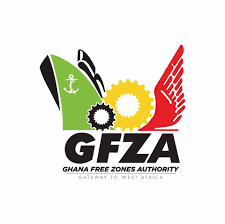
The Ghana Free Zones Authority (GFZA) has hosted a high level delegation from the Greater Washington Black Chamber of Commerce (GWBCC) to discuss partnership opportunities aimed at promoting trade and investment between Ghana and the United States. The engagement forms part of GFZA’s broader strategy to attract foreign direct investment and expand Ghana’s participation in global value chains.
The delegation, led by Mr. Andres Hayes, President and Chief Executive Officer of Airtifare Group, met with GFZA officials to learn about Ghana’s Free Zones Programme and its range of investment incentives. These include tax exemptions, streamlined regulatory procedures, and access to infrastructure designed to attract export oriented businesses to the West African nation.
Dr. Patience Acolor, Director of Corporate Affairs and Public Relations, on behalf of GFZA’s Chief Executive Officer, Dr. Mary Awusi, made a presentation outlining Ghana’s strong record of political stability and investor friendly environment. She emphasized that these factors are necessary in facilitating private sector growth, positioning Ghana as a strategic gateway for trade and manufacturing in West Africa.
The Ghana Free Zones Programme offers substantial benefits to qualifying companies, including 100 percent exemption from direct and indirect duties on imports for production and exports, and 100 percent income tax exemption on profits for 10 years. Companies operating in the free zones can sell up to 30 percent of production to the domestic market, while 100 percent foreign ownership is allowed for all enterprises.
Members of the GWBCC delegation expressed strong interest in investing within Ghana’s Free Zones, noting the country’s attractive business climate and the professionalism of the Authority. The delegation commended the GFZA for its hospitality and transparent engagement during the discussions, highlighting the potential for collaboration in various sectors.
Ghana’s membership in the Economic Community of West African States (ECOWAS) provides operators with access to a regional market of over 400 million consumers. Additionally, Ghana’s unique position as host of the African Continental Free Trade Area (AfCFTA) secretariat, headquartered in Accra, gives investors in Ghana’s Free Zones access to a unified continental market of 1.4 billion people.
The Greater Washington Black Chamber of Commerce, founded in 2017, represents black business owners in the Washington DC metropolitan area. The organization is committed to promoting black business growth by providing resources that increase revenue through contracting, partnering, and investing. GWBCC is a member of the national US Black Chambers, Inc. and collaborates with existing black chambers across the District of Columbia metropolitan area.
Both sides agreed to pursue future collaboration aimed at boosting economic growth, creating jobs, and strengthening bilateral business relations between Ghana and the United States. The discussions explored opportunities in sectors including agro food processing, information and communication technology, light manufacturing, and renewable energy.
Dr. Awusi has been actively leading GFZA’s investment promotion efforts since her appointment as the first female Chief Executive Officer of the Authority. Under her leadership, the GFZA has intensified engagements with potential investors from various countries, including recent missions to the United States, Dubai, and other key markets.
The Authority is also advocating for the passage of the Special Economic Zone (SEZ) Act, which would strategically drive investment and reinforce GFZA’s position as a leading investment promotion agency on the continent. According to Dr. Awusi, the passage of the Act would provide a more robust framework for attracting and managing investments across Ghana.
Ghana’s Free Zones Programme has been operating since 1995 under the Free Zones Act (Act 504), with the aim of improving the processing and manufacturing of goods through the formation of Export Processing Zones. The programme has attracted investments across various sectors, contributing to job creation and export diversification.
Companies operating in free zones must export at least 70 percent of their annual output, with sales to the local market subject to Ghanaian customs law and consequently taxable. As long as they are not environmentally hazardous, licensed free zone firms are allowed to create any kind of goods or services for export.
The engagement with the GWBCC delegation represents part of Ghana’s broader strategy to diversify its sources of foreign direct investment and strengthen economic ties with the United States. Recent data shows total goods trade between Ghana and the United States reached 2.1 billion dollars in 2024, with significant opportunities for expansion in various sectors.
As Ghana continues to position itself as a manufacturing and services hub for West Africa, the GFZA remains focused on attracting investors who can leverage the country’s strategic location, skilled workforce, and favorable business environment to access regional and continental markets.
